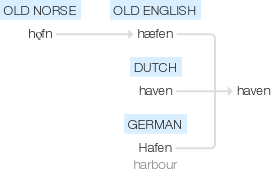Haven
late Old English hæfen, from Old Norse hǫfn ; related to Dutch haven, German Hafen ‘harbour’.
wiktionary
From Middle English haven, havene, from Old English hæfen(“haven; harbour; port”), from Proto-West Germanic *habanu, from Proto-Germanic *habnō, *habanō (compare Dutch haven, German Hafen, Norwegian/Danish havn, Swedish hamn), from Proto-Germanic *habą(“sea”) (compare Old English hæf, Middle Low German haf, Old Norse haf(“sea”), German Haff(“bay or lagoon behind a spit”), perhaps, in the sense of "heaving sea", etymologically identical with Old Norse haf(“heaving, lifting, uplift, elevation”), derived from Proto-Germanic *habjaną(“to lift, heave”)), or from Proto-Indo-European *kh₂pnós (compare Old Irish cúan(“harbor, recess, haven”)). Doublet of abra.
etymonline
haven (n.)
late Old English hæfen "haven, port," from Old Norse höfn "haven, harbor" or directly from Proto-Germanic *hafno- (source also of Danish havn, Middle Low German havene, German Hafen), perhaps from PIE root *kap- "to grasp" (source of have) on notion of place that "holds" ships. But it might rather be related to Old Norse haf, Old English hæf "sea" (see haff). Figurative sense of "refuge," now practically the only sense, is c. 1200.
